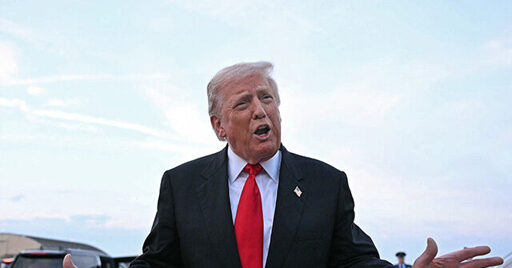President Donald Trump on Sunday made it clear how he feels about people who do not agree with tariffs.
Writing in a post on his Truth Social platform, the president said, “People that are against Tariffs are FOOLS!”
“We are now the Richest, Most Respected Country In the World, With Almost No Inflation, and A Record Stock Market Price. 401k’s are Highest EVER. We are taking in Trillions of Dollars and will soon begin paying down our ENORMOUS DEBT, $37 Trillion,” he added.
“Record Investment in the USA, plants and factories going up all over the place. A dividend of at least $2000 a person (not including high income people!) will be paid to everyone,” Trump concluded.
His statement comes as the U.S. Supreme Court heard arguments recently about the legality of his use of emergency powers to impose tariffs on imports from nearly every trading partner, Breitbart News reported Wednesday:
At issue is whether Mr. Trump properly invoked the International Emergency Economic Powers Act (IEEPA) of 1977, a law that gives presidents broad authority during national emergencies, to levy tariffs he says are necessary to address trade deficits, pressure other countries to help the U.S. combat fentanyl smuggling, and protect American manufacturing.
The case has enormous implications for American businesses and consumers, as well as for Mr. Trump’s economic agenda. The president has made tariffs a centerpiece of his trade policy, using them to pressure foreign governments and bring manufacturing back to the United States.



I’m in favor of bringing manufacturing back to the U.S. through tariffs. For too long, other countries have taken advantage of economic conditions to the detriment of American workers. I speak from personal experience: overregulation in this country sent my own job in industry to China and India.
Another issue that isn’t being addressed enough is the impact of foreign workers on the American workforce. There’s a place for foreign talent in certain sectors, but too often the American worker has been undercut—not just by foreign labor, but now by AI as well. It doesn’t benefit anyone here when a tech professional making $150,000 a year is replaced by two foreign workers on visas making $50,000 each, with the rest of the work taken over by AI. That’s a problem we need to confront if we’re serious about protecting American jobs.
I also believe that companies that start making major profits by eliminating workers through AI should have to pay a tax into a fund that supports welfare programs. That way, the welfare system starts paying for itself. I think this could eventually lead to some form of universal income, which I generally support given the current economic situation.
And let’s be clear: CEOs who give themselves $100 million salaries while sending all the jobs overseas should be stripped of their golden parachutes and have their assets seized. That’s absurd. There’s a difference between building a strong company in your home country and employing your citizens versus stripping manufacturing and other operations, paying workers pennies overseas, and running off with massive paychecks. That shit is ridiculous—but hey, that’s just me speaking.
So I ask out of serious curiosity, when you say over regulation, are we talking safety, environmental, financial?
I ask because the willingness of companies to pay workers in another country to engage in practices that are prohibited in the first country seems like corporate exploitation.
If it’s due to environmental regulation that seems to be a case where often an environmentally friendlier way of performing a lot of processes exists, but it costs more money, so companies choose to exploit weaker regulation somewhere that hasn’t caught up to not poisoning the planet to benefit companies. Plus a lot of companies hate being told to clean up after themselves and would prefer to simply leave an area once they have extracted maximum value from it.
As for financial, look, I am Australian, here we have historically benefitted from a strong labour movement that has granted us livable wages, paid sick leave etc, however our rich people are doing everything in their power to roll back and undermine that.
In each case the problem seems in my opinion to revolve around a class of extremely wealthy shitheels who want to make all the money and they will take the path of least resistance to make that happen. Perhaps, Internationally we need to view the existence of billionaires as a critical failure of our systems and either legislate to prevent them from occurring, or find some way to drastically increase the hazard levels associated with trying to gather that much wealth in the first place.
I personally doubt that Tariffs will meaningfully change the manufacturing landscape internationally, I think Trump tanking the US economy will however increase desperation and lead US citizens to compromise on the conditions they will work under, in effect lowering the expectations of US workers to the point they will be willing to compete with off shore workers.
You make some really valid points about corporate exploitation and the ways regulations interact with global labor practices. I agree that a lot of the problem comes down to extremely wealthy individuals chasing profit at all costs—they often exploit gaps in regulation or weaker protections abroad rather than innovate responsibly at home.
When I talk about “overregulation,” I mean it broadly—safety, environmental, and financial. From my experience, some of those rules, while well-intentioned, made it cheaper and easier for companies to shift operations overseas rather than comply domestically. I’m not saying the rules themselves are bad, but the system doesn’t always balance worker protection with keeping industry viable in the U.S.
I get what you’re saying about tariffs—they’re not a perfect solution, and they won’t magically bring back manufacturing. My point is more that some form of economic pressure or policy to make domestic labor competitive again is necessary. Otherwise, you’re right—workers get forced to lower their standards to compete globally, and that just perpetuates exploitation rather than fixing it.
On billionaires, I agree completely. When a handful of people can accumulate that much wealth while dismantling the livelihoods of millions, the system is failing. I don’t have all the answers for that, but I think policies that make companies accountable for the human and economic cost of their decisions—whether through taxation, labor protections, or regulating how much CEOs can extract—would at least begin to address it.